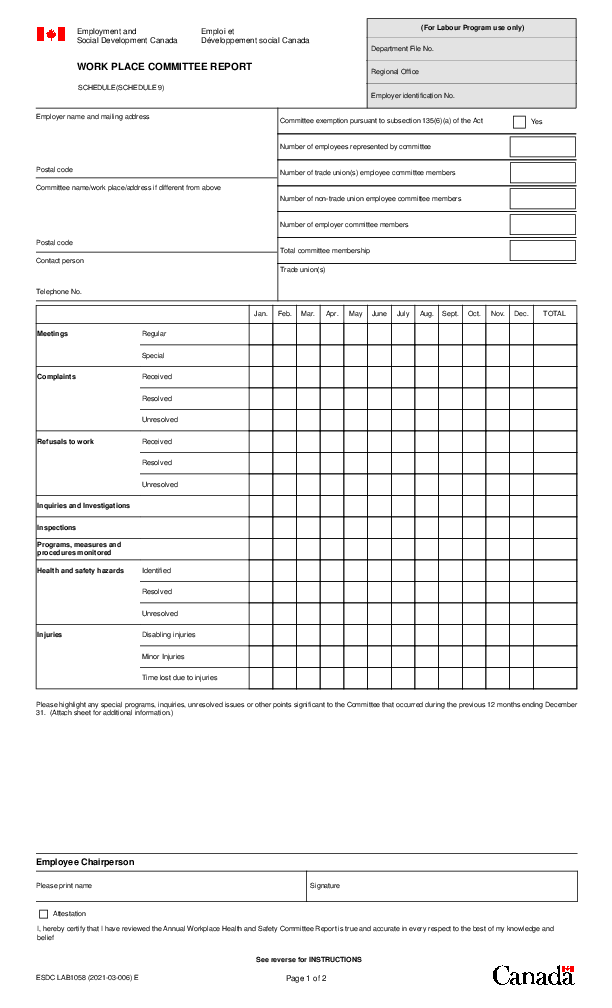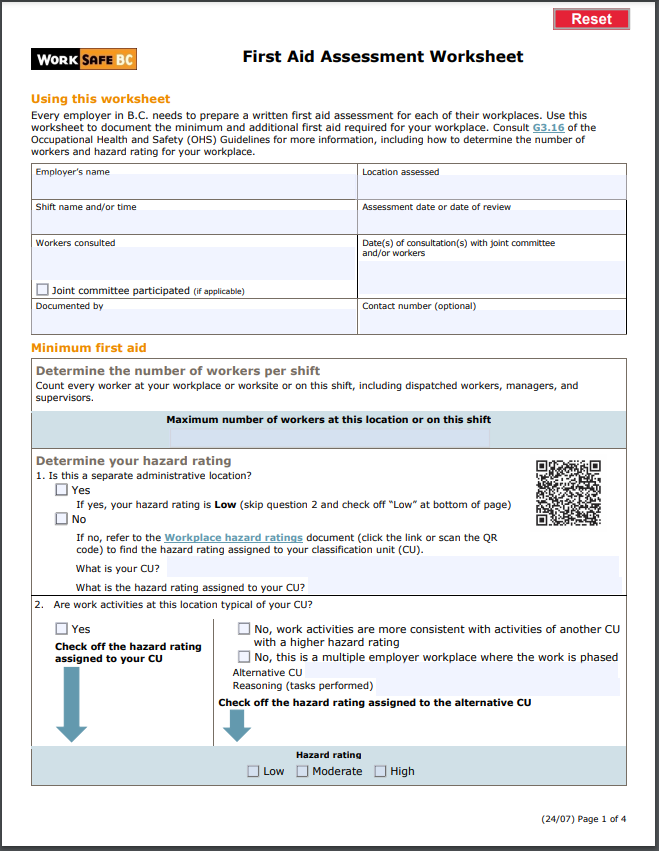
Loading & Unloading: Make it Simple, Make it Safe / ਲੋਡਿੰਗ ਅਤੇ ਅਨਲੋਡਿੰਗ: ਇਸਨੂੰ ਆਸਾਨ ਬਣਾਉ, ਇਸਨੂੰ ਸੁਰਖਿਤ ਬਣਾਉ
Despite new technologies and safety devices, there are concerns.
Despite the advances in equipment technology and the availability of new safety devices, loading and unloading safety remains one of the biggest areas of concern among trucking companies.
Safety doesn’t have to be complicated, nor does it have to be expensive. It needs to be adequate to protect people from the risks that your operation creates. In my experience, some of the safest yards and warehouses are the ones that have implemented very simple but well-defined operating procedures.
The key areas to be considered when designing operating procedures for the yard or warehouse include:
– traffic management
– vehicle isolation
– preventing pedestrian/truck interactions, and
– exclusion zones.
For example, you might not easily be able to prevent things from falling off the other side of a flat deck when you are loading or unloading, but you can very quickly set up some guidelines and an exclusion zone to prevent people from being in the “fall zone.”
Managing the flow of traffic and reducing pedestrian/equipment interactions can also be controlled quite easily by using exclusion zones. Physical controls can be used to prevent pedestrians from entering high-risk areas and to minimize loading numbers in these areas – people and forklifts.
Vehicle and driver isolation are also a vital part of a simple loading/unloading standard operating procedure (SOP). Always try to isolate the driver from both the vehicle and the loading area and also isolate the keys, when possible. This is easily achievable by simply having a designated waiting area for drivers and a process to ensure that the keys are collected before loading commences. By placing the driver and the keys where the loader can see them, you eliminate the risk of both injury to the driver and the possibility of loader/equipment damage due to a vehicle moving during loading/unloading.
If loading requires a second person to be present when equipment is being used, you must develop clear procedures to ensure that either the equipment operator and the second worker have a way of seeing each other at all times or that some sort of barrier system is used to separate the two. Docks need to be suitable for the type of equipment used and trailers that are spotted without a power unit need to be adequately secured to prevent them from moving and/or tipping over.
None of this needs to be over-engineered and simplicity will ensure the most success, but without clear guidelines, the risk of injury can be significant. Keeping everything/everyone in defined areas and out of each other’s way doesn’t have to be complicated but, when done right, can be very effective.
In a nutshell, when implementing operating procedures for loading/unloading, you need to:
– understand the process
– simplify it
– minimize the number of people involved, and
– ensure adequate training
Stay up to date on safety and sign up for our weekly newsletter!
ਅਵ੍ਵਲ/ ਬੇਹਤਰ ਉਪਕਰਣ ਟੇਕ੍ਨਾਲੋਜੀ ਅਤੇ ਨਵੇਂ ਸੁਰ੍ਖਯਾ ਉਪਕਰਣਾ ਦੀ ਉਪਲਬਧਾ ਦੇ ਬਾਵਜੂਦ, ਲੋਡਿੰਗ ਅਤੇ ਅਨਲੋਡਿੰਗ ਸੁਰ੍ਖਯਾ ਟ੍ਰ੍ਕਿੰਗ ਕਮ੍ਪਨਿਯਾਂ ਵਿਚ ਚਿੰਤਾ ਦਾ ਸਬ ਤੋਂ ਮੁਖ ਵਿਸ਼ੇ ਬਣਯਾ ਹੋਯਾ ਹੈI
ਸੁਰ੍ਖਯਾ ਨਾ ਹੀ ਪੇਚੀਦਾ ਹੋਣੀ ਚਾਹੀਦੀ, ਅਤੇ ਨਾ ਹੀ ਇਹ ਮੇਹਂਗੀ ਹੋਣੀ ਚਾਹੀਦੀI ਇਸਨੂੰ ਤੁਹਾਡੇ ਕੰਮ ਦੇ ਦੋਉਰਾਨ ਪੈਦਾ ਹੋਏ ਜੋਖਮਾਂ ਤੋਂ ਲੋਕਾਂ ਨੂੰ ਬਚਾਉਣ ਯੋਗਯ ਹੋਣ ਦੀ ਲੋੜ ਹੈI ਮੇਰੇ ਅਨੁਭਵ ਮੁਤਾਬਕ, ਸਬ ਤੋਂ ਸੁਰਖਿਤ ਯਾਰਡ ਅਤੇ ਗੋਦਾਮਾਂ ਵਿਚੋਂ ਕੂਝ ਏਹੋ ਜੇਹੇ ਹਨ ਜਿਹਨਾਂ ਨੇ ਬੜੇ ਸੋਖੇ ਲੇਕਿਨ ਸਪਸ਼ਟ ਤੌਰ ਤੇ ਸੰਚਾਲਨ/ਪਰਿਚਾਲਨ ਪ੍ਰਕ੍ਰਿਯਾਵਾਂ ਨੂੰ ਲਾਗੂ ਕੀਤਾ ਹੈI
ਯਾਰਡ ਜਾਂ ਗੋਦਾਮ ਦੀ ਸੰਚਾਲਨ/ਪਰਿਚਾਲਨ ਪ੍ਰਕ੍ਰਿਯਾਵਾਂ ਡਿਜ਼ਾਇਨ ਕਰਨ ਵੇਲੇ ਵਿਚਾਰੇ ਜਾਣ ਵਾਲੇ ਮੁਖ ਖੇਤ੍ਰਾਂ ਵਿਚ ਸ਼ਾਮਿਲ ਹਨ:
- ਟ੍ਰੇਫ਼ਿਕ ਪ੍ਰਬੰਧਨ,
- ਵਾਹਨ ਪ੍ਰਥਿਕਰਨ/ਵਖਰਾ ਕਰਨਾ,
- ਪੈਦਲ ਚਲਣ ਵਾਲੇ/ਟ੍ਰਕ ਇੰਟਰੇਕ੍ਸ਼ਨ ਨੂੰ ਰੋਕਣਾ, ਅਤੇ
- ਅਲਹੇਦਾ/ਪ੍ਰਤਿਬੰਧਿਤ ਖੇਤ੍ਰI
ਉਦਹਾਰਣ ਦੇ ਲਈ, ਲੋਡਿੰਗ ਜਾਂ ਅਨਲੋਡਿੰਗ ਕਰਨ ਵੇਲੇ, ਹੋ ਸਕਦਾ ਹੈ ਤੂਸੀ ਫਲੈਟ ਡੇਕ ਦੇ ਦੂਜੇ ਪਾਸੇ ਚੀਜ਼ਾਂ ਨੂੰ ਡਿਗਣ ਤੋਂ ਰੋਕਣ ਦੇ ਕਾਬਿਲ ਨਾ ਹੋਵੋ, ਲੇਕਿਨ ਤੂਸੀ ਲੋਕਾਂ ਨੂੰ “ਫਾੱਲ ਜ਼ੋਨ” ਵਿਚ ਆਉਣ ਤੋਂ ਰੋਕਣ ਲਈ ਬਹੁਤ ਜਲਦੀ ਕੂਝ ਦਿਸ਼ਾ ਨਿਰਦੇਸ਼ ਅਤੇ ਅਲਹੇਦਾ ਪ੍ਰਤਿਬੰਧਿਤ ਜ਼ੋਨ ਸਥਾਪਿਤ ਕਰ ਸਕਦੇ ਹੋI
ਟ੍ਰੈਫਿਕ ਦੀ ਆਵਾਜਾਹੀ ਦਾ ਪ੍ਰਬੰਦਨ ਕਰਕੇ ਅਤੇ ਪੈਦਲ ਆਣ-ਜਾਣ ਵਾਲੇਯਾਂ/ਉਪਕਰਣ ਇੰਟਰੇਕ੍ਸ਼ਨ ਨੂੰ ਅਲਹੇਦਾ/ ਪ੍ਰਤਿਬੰਧਿਤ ਜ਼ੋਨ ਦਾ ਉਪਯੋਗ ਕਰਕੇ ਆਸਾਨੀ ਨਾਲ ਕੰਟ੍ਰੋਲ ਕੀਤਾ ਜਾ ਸਕਦਾ ਹੈI ਸ਼ਾਰੀਰਿਕ ਬਲ ਦਾ ਉਪਯੋਗ ਕਰਕੇ ਪੈਦਲ ਚਲਣ ਵਾਲੇਯਾਂ ਨੂੰ ਜਯਾਦਾ ਜੋਖਿਮ ਖੇਤ੍ਰ ਵਿਚ ਦਾਖਿਲ ਹੋਣ ਤੋਂ ਰੋਕੇਯਾ ਜਾ ਸਕਦਾ ਹੈ ਅਤੇ ਫੋਰਕਲਿਫਟ ਦਾ ਉਪਯੋਗ ਇਹਨਾਂ ਖੇਤ੍ਰਾਂ ਵਿਚ ਲੋਡਿੰਗ ਸੰਖਯਾ ਨੂੰ ਘਟ ਤੋਂ ਘਟ ਕਰਨ ਲਈ ਕੀਤਾ ਜਾ ਸਕਦਾ ਹੈI
ਵਾਹਨ ਅਤੇ ਚਾਲਕ ਨੂੰ ਵਖਰੇ ਕਰਨਾ ਭੀ ਸਾਧਾਰਣ ਲੋਡਿੰਗ/ ਅਨਲੋਡਿੰਗ ਸਟੇਨਡਰਡ ਓਪੇਰੇਟਿੰਗ ਪ੍ਰੋਸੀਜਰ (ਏਸ ਔ ਪੀ) ਦਾ ਇਕ ਅਹਿਮ ਹਿੱਸਾ ਹੈI ਹਮੇਸ਼ਾ ਚਾਲਕ ਨੂੰ ਵਾਹਨ ਅਤੇ ਲੋਡਿੰਗ ਖੇਤ੍ਰ ਤੋਂ ਵਖ ਕਰਨ ਦੀ ਕੋਸ਼ਿਸ਼ ਕਰੋ ਅਤੇ ਮੁਮਕਿਨ ਹੋਵੇ ਤਾਂ ਚਾਬਿਯਾਂ ਨੂੰ ਭੀ ਵਖ ਕਰਨ ਦੀ ਕੋਸ਼ਿਸ਼ ਕਰੋI ਇਹ, ਚਾਲਕਾਂ ਲਈ ਇਕ ਨਿਰਧਾਰਤ ਵੇਟਿੰਗ ਖੇਤ੍ਰ ਰਖ ਕੇ ਅਤੇ ਇਕ ਪ੍ਰਕ੍ਰਿਯਾ ਇਹ ਸੁਨਿਸ਼ਚਿਤ ਕਰਨ ਲਈ ਕਿ ਲੋਡਿੰਗ ਸ਼ੁਰੂ ਹੋਣ ਤੋਂ ਪਹਿਲਾਂ ਚਾਬਿਯਾਂ ਲੇ ਲਿਤ੍ਤੀਯਾਂ ਨੇ, ਇਸਦੇ ਜਰਿਏ ਆਸਾਨੀ ਨਾਲ ਪੂਰਾ ਕੀਤਾ ਜਾ ਸਕਦਾ ਹੈI ਚਾਲਕ ਅਤੇ ਚਾਬਿਯਾਂ ਨੂੰ ਉਥੇ ਰਖ ਕੇ ਜਿਥੇ ਤੋਂ ਲੋਡਰ ਉਹਨਾਂ ਨੂੰ ਵੇਖ ਸਕਦਾ ਹੈ, ਤੂਸੀ ਲੋਡਿੰਗ/ ਅਨਲੋਡਿੰਗ ਵੇਲੇ ਵਾਹਨ ਚਲਣ ਤੋਂ ਚਾਲਕ ਨੂੰ ਸੱਟ ਲਗਣ ਦੇ ਅਤੇ ਲੋਡਰ/ਉਪਕਰਣ ਦੋਵਾਂ ਦੇ ਨੁਕਸਾਨ ਦੀ ਸਮ੍ਭਾਵਨਾ ਨੂੰ ਖਤਮ ਕਰਦੇ ਹੋI
ਜੇਕਰ ਲੋਡਿੰਗ ਵੇਲੇ ਦੂਜੇ ਬੰਦੇ ਦੀ ਲੋੜ ਹੋਵੇ ਜਦੋਂ ਉਪਕਰਣ ਦੀ ਵਰਤੋਂ ਕੀਤੀ ਜਾ ਰਹੀ ਹੋਵੇ ਤਾਂ ਤੁਹਾਨੂੰ ਲਾਜ਼ਮੀ ਤੌਰ ਤੇ ਇਹ ਸੁਨਿਸ਼ਚਿਤ ਕਰਨ ਲਈ ਸਪਸ਼ਟ ਪ੍ਰਕ੍ਰਿਯਾਵਾਂ ਦਾ ਵਿਕਾਸ ਕਰਨਾ ਪਵੇਗਾ ਕਿ ਜਾਂ ਤਾਂ ਉਪਕਰਣ ਔਪਰੇਟਰ ਅਤੇ ਦੂਜਾ ਕਰਮਚਾਰੀ ਹਰ ਵੇਲੇ ਇਕ ਦੂਜੇ ਨੂੰ ਵੇਖ ਸਕਦੇ ਹੋਣ ਜਾਂ ਦੋਵਾਂ ਨੂੰ ਵਖ ਕਰਨ ਲਈ ਕਿਸੇ ਬੈਰਿਯਰ ਪ੍ਰਣਾਲੀ ਦਾ ਉਪਯੋਗ ਕੀਤਾ ਜਾਵੇI ਡੋੱਕਸ ਨੂੰ ਉਪਯੋਗ ਕੀਤੇ ਜਾ ਰਹੇ ਉਪਕਰਣਾਂ ਮੁਤਾਬਕ (ਯੋਗਯ/ਕਾਬਿਲ) ਹੋਣ ਦੀ ਜਰੂਰਤ ਹੈ ਅਤੇ ਬਿਜਲੀ ਯੂਨਿਟ ਦੇ ਬਗੈਰ ਸਪੋਰ੍ਟ ਕੀਤੇ ਗਏ ਟ੍ਰੇਲਰਾਂ ਨੂੰ ਉਨ੍ਹਾਂ ਨੂੰ ਅਗੇ ਵਧਣ ਅਤੇ/ ਜਾਂ ਡਿਗਣ ਤੋਂ ਰੋਕਣ ਲਈ ਸਹੀ ਤਰੀਕੇ ਨਾਲ ਸੁਰਖਿਤ ਕਰਣ ਦੀ ਲੋੜ ਹੈI
ਇਸ ਵਿਚੋਂ ਕਿਸੇ ਲਈ ਭੀ ਜਯਾਦਾ ਇੰਜੀਨੀਅਰਿੰਗ ਦੀ ਲੋੜ ਨਹੀਂ ਹੈ ਅਤੇ ਸਰਲਤਾ ਸਬ ਤੋਂ ਵਧ ਸਫਲਤਾ ਪ੍ਰਾਪਤ ਕਰੇਗੀ, ਪਰ ਬਿਨਾ ਸਪਸ਼ਟ ਦਿਸ਼ਾ-ਨਿਰਦੇਸ਼ ਦੇ ਸੱਟ ਲਗਣ ਦਾ ਜੋਖਿਮ ਹੋ ਸਕਦਾ ਹੈI ਹਰ ਚੀਜ਼ ਨੂੰ/ ਸਬ ਨੂੰ ਸੁਰਖਿਤ ਖੇਤ੍ਰ ਵਿਚ ਰਖਣਾ ਅਤੇ ਇਕ ਦੁਜੇ ਦੇ ਰਸਤੇ ਵਿਚ ਨਾ ਆਣ ਦੇਣਾ, ਇਹ ਇਨਾ ਭੀ ਔਖਾ ਨਹੀ ਹੈ ਪਰ, ਜਦੋਂ ਸਹੀ ਤਰੀਕੇ ਨਾਲ ਕੀਤਾ ਜਾਂਦਾ ਹੈ ਤਾਂ ਜਯਾਦਾ ਪ੍ਰਭਾਵਸ਼ਾਲੀ ਹੋ ਸਕਦਾ ਹੈI
ਸੰਖੇਪ ਵਿਚ, ਲੋਡਿੰਗ/ ਅਨਲੋਡਿੰਗ ਲਈ ਸੰਚਾਲਨ ਪ੍ਰਕ੍ਰਿਆਵਾਂ ਲਾਗੂ ਕਰਨ ਵੇਲੇ, ਤੁਹਾਨੂੰ ਲੋੜ ਹੋਂਦੀ ਹੈ:
- ਪ੍ਰਕ੍ਰਿਯਾ ਨੂੰ ਸਮਝਣ ਦੀ,
- ਇਸਨੂੰ ਸਰਲ ਬਨਾਉਣ ਦੀ,
- ਘਟ ਤੋਂ ਘਟ ਲੋਕਾਂ ਨੂੰ ਸ਼ਾਮਿਲ ਕਰਨ ਦੀ, ਅਤੇ
- ਪ੍ਰਯਾਪਤ ਪ੍ਰਸ਼ਿਕ੍ਸ਼ਨ ਸੁਨਿਸ਼ਚਿਤ ਕਰਨ ਦੀI
Latest Resources
ESDC Workplace Committee Report
How to Complete WorkSafeBC’s First Aid Assessment
Learn how to complete WorkSafeBC's First Aid Assessment with this step-by-step guide. ...

